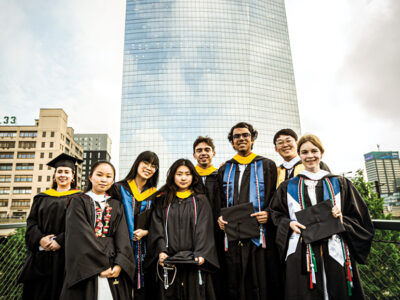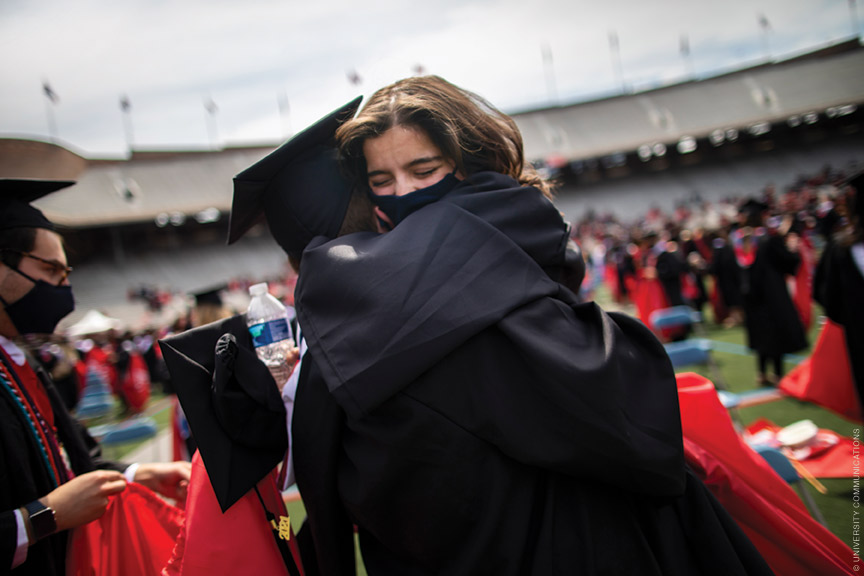
A resilient Class of 2021 was encouraged to pair “humility and ambition” as it moves on after a year of challenges and sacrifices.
“Our seniors have a problem,” began Penn President Amy Gutmann at the start of the University’s 265th Commencement ceremony on May 17. Looking over Franklin Field at the first large gathering on campus since the pandemic began, Gutmann explained that due to the postponement of last year’s in-person Hey Day, “I cannot declare you graduates because I didn’t have the chance to declare you seniors.”
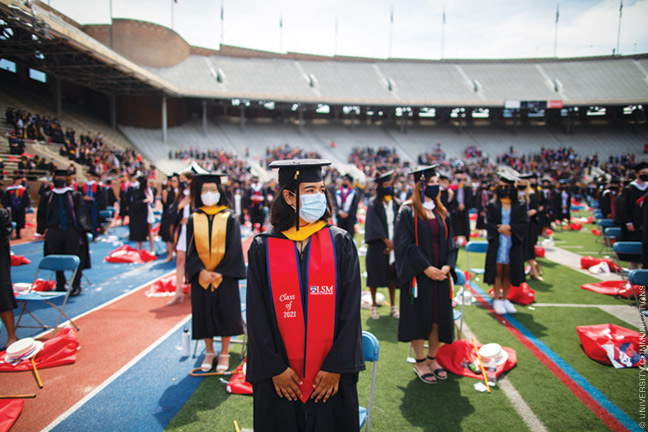
“But we can fix this,” she continued, instructing them to open the red bags underneath their chairs, which contained the iconic walking cane and flat-brimmed hat that the junior class traditionally receives. After snapping off a piece of their hats (more sanitary than the customary biting), the students were declared seniors.
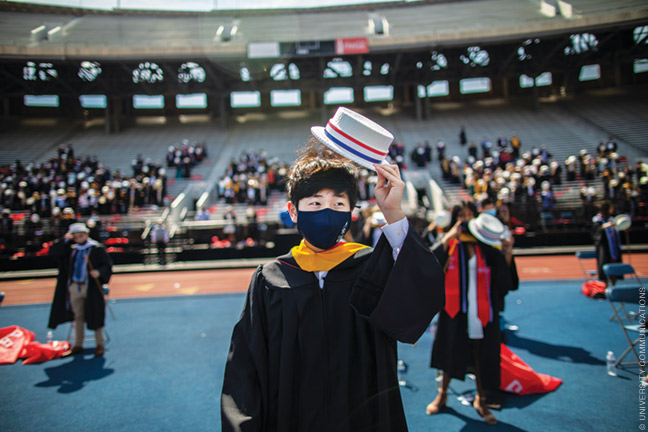
It was a markedly smaller crowd than in years past—the stands were devoid of friends and families, who instead watched via livestream at commencement.upenn.edu. Only graduating seniors who abided by Penn’s asymptomatic testing protocol were invited to attend the ceremony, with chairs on the field placed six feet apart. (Commencement ceremonies for graduate and professional schools remained virtual only.)
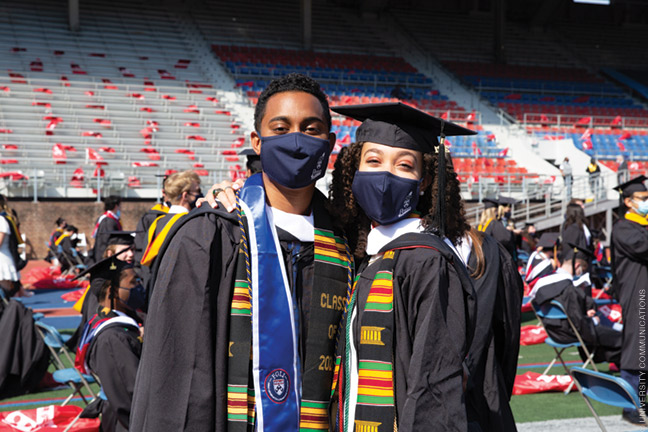
But the day was not lacking in pomp and circumstance. As members of the Class of 2021 took their seats, prerecorded messages from the families of the graduates and a performance by the Penn Band aired on a screen. Outgoing chair of the board of trustees David L. Cohen L’81 delivered an opening proclamation, and graduating senior Henry Platt C’21 sang the national anthem.
In his invocation, University chaplain and vice president for social equity and community Charles “Chaz” Howard C’00 began “with just two words: thank you. Thank you for this class. Thank you for this day.”
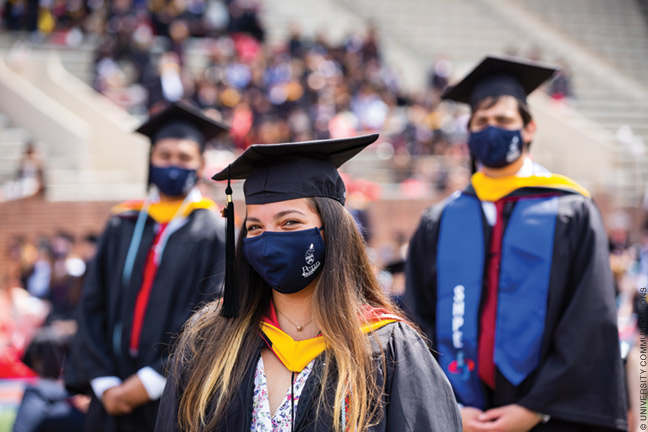
Gutmann acknowledged the challenges and sacrifices this graduating class has navigated. “Learning online, masking up, remotely singing with Counterparts or playing with the Penn Band, marching for justice, [and] missing milestones so that others may enjoy more life. … We’re at the threshold of a bright future thanks to your everyday acts in solidarity with and for others,” she said.
Drawing comparisons to the Class of 1919, which graduated amidst the influenza pandemic and the close of World War I, Gutmann quoted a line from their yearbook that read: “It will always be remembered that as the class advanced, it helped those who followed.” She added of the Class of 2021, “You, too, advanced while helping those who follow.”
Commencement speaker Laurene Powell Jobs C’85 W’85, a philanthropist and social justice advocate, recalled the resiliency her mother modeled after becoming a single parent to four children when Powell Jobs’ father, a US Marine Corps pilot, died in a training accident.
To attend Penn she had to do some “creative financing,” but it was here that she “caught the entrepreneurship bug” as the founder of a student-run agency that delivered birthday cakes and care packages to students (and is still functioning under the name Special Deliveries). After graduation, she worked at Goldman Sachs, but she felt herself drawn toward another path.
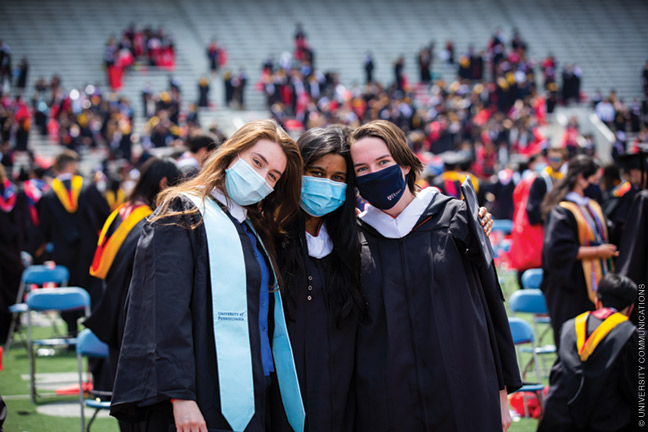
“Change in ourselves and change in the world happens similarly,” she said. “It comes slowly, slowly, and then all at once. What matters is your readiness for the moment of revelation, of challenge, of opportunity. We have to be prepared to walk through the door when it opens, or by our own power and purpose to open it ourselves. And sometimes we need to tear down walls, the ones within and the ones without.”
After leaving Goldman Sachs, she started an organic vegetarian food company called Terravera—“a rather radical idea 30 years ago”—and then later changed course to found College Track, a nonprofit that equips low-income high school students with resources to earn college degrees. “There is no higher or better use of your time on this planet than to be helpful to others,” she said. “I learned this at College Track.”
Still, she said, “I wanted to do more to address the multitude of interlocking injustices that were evident from working with students and their families.” So she founded the Emerson Collective, an organization aiming to create a more just society through impact investing, philanthropy, and advocacy. “Overriding everything is a recognition that humanity is bound together, and we realize our own potential only by caring for each other.”
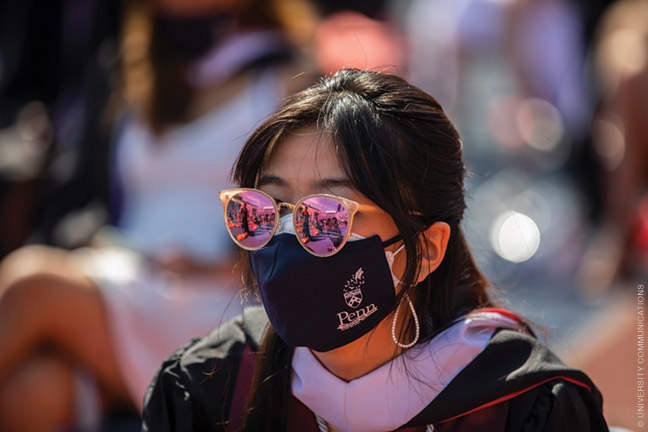
“All of life is reciprocity, filled with the circular joy in giving and grace in receiving,” she explained. “[But] it’s important to partner your joy with humility. Even as we use our heads, we must learn to bow them. Humility and ambition need not contradict each other.”
Speaking of her late husband, Apple cofounder Steve Jobs, who died in 2011, she said, “We do not pass through grief and leave it behind. Instead, I found, we integrate it—along with all the joyful memories, all the laughter, all the love we feel—into who we are. One of life’s most beautiful dimensions is integrating those you’ve loved and lost into your own being. We see more, and we understand more, and we love more.”
“Infuse your values into every part of what you do, and how you live,” Powell Jobs said in closing. “Your values should be like your fingerprints: proof of where you have been and what you have touched.” —NP



